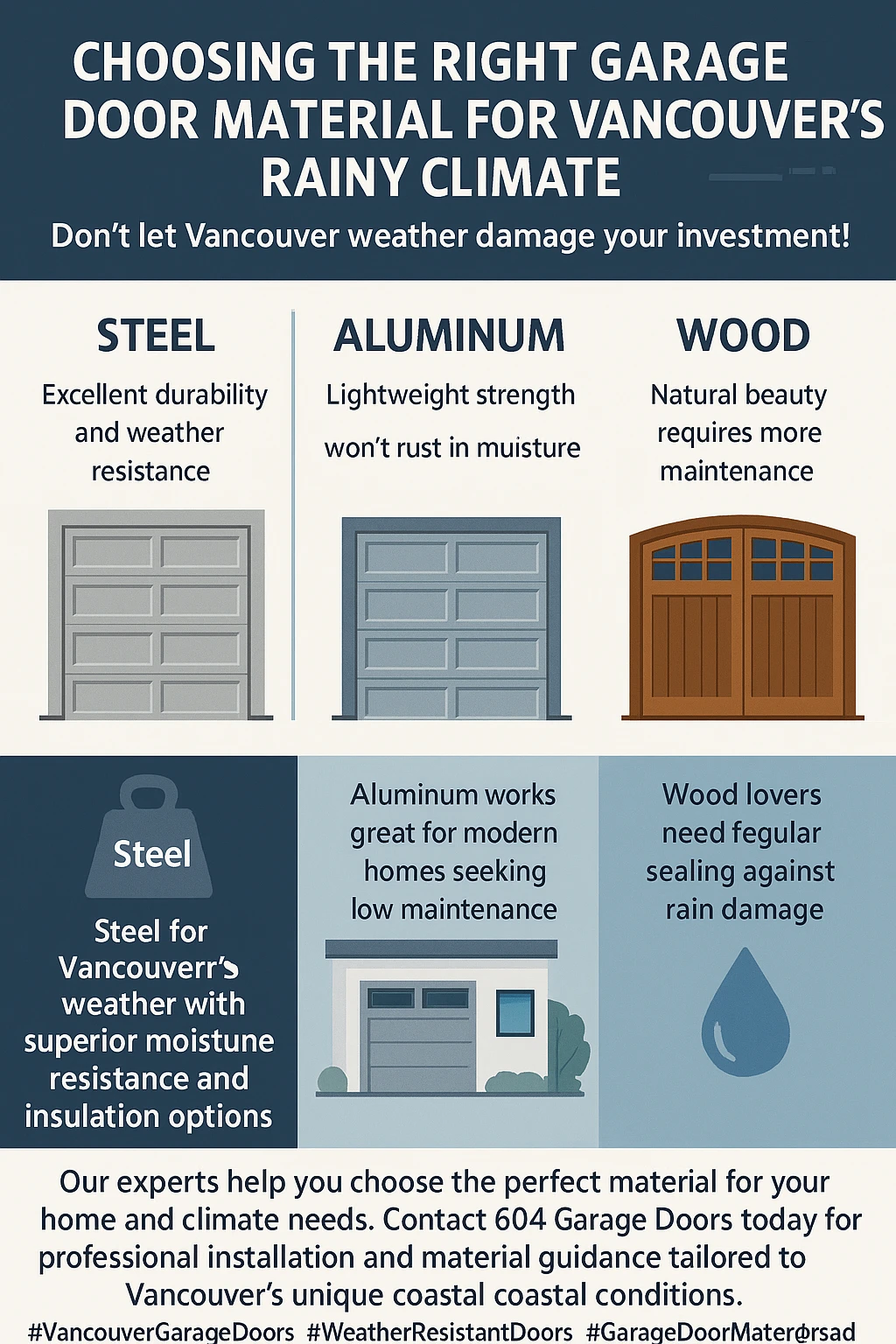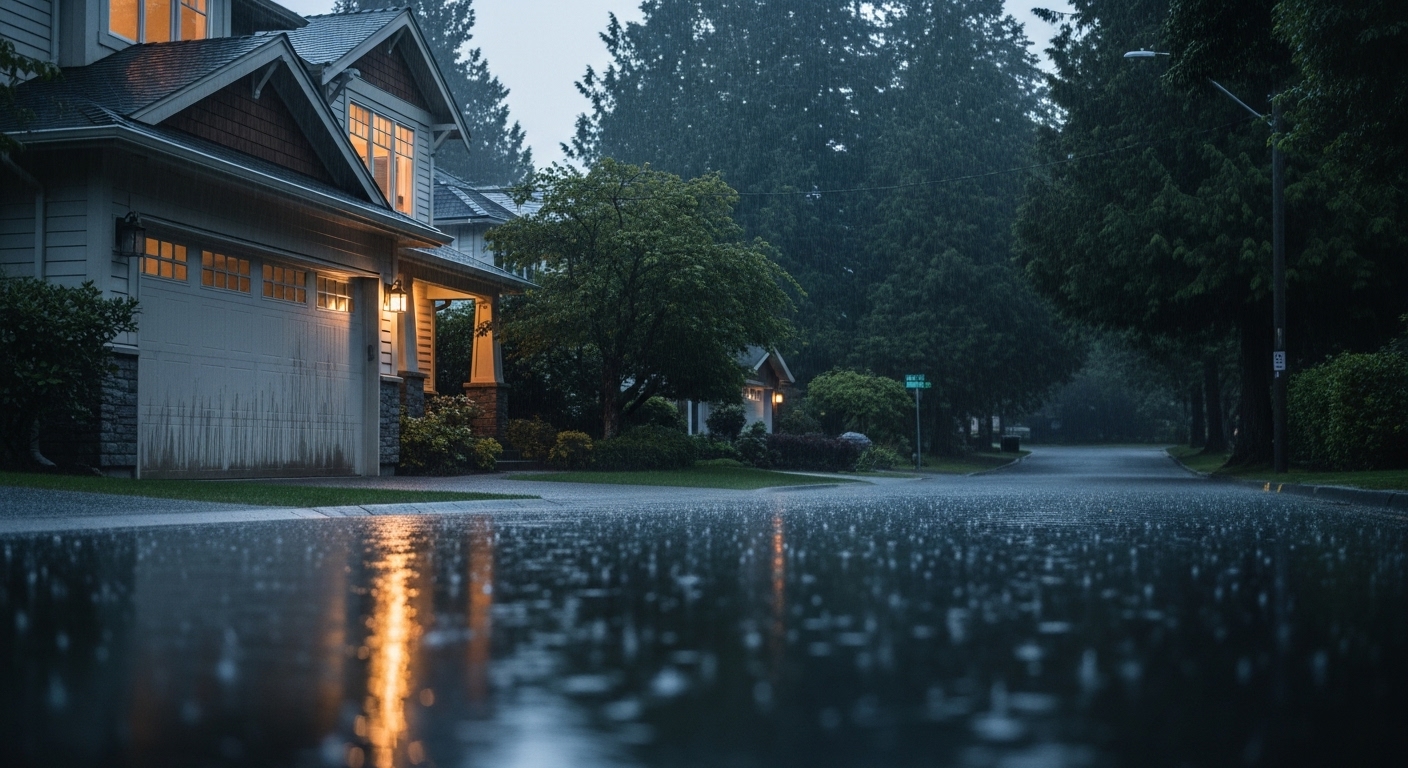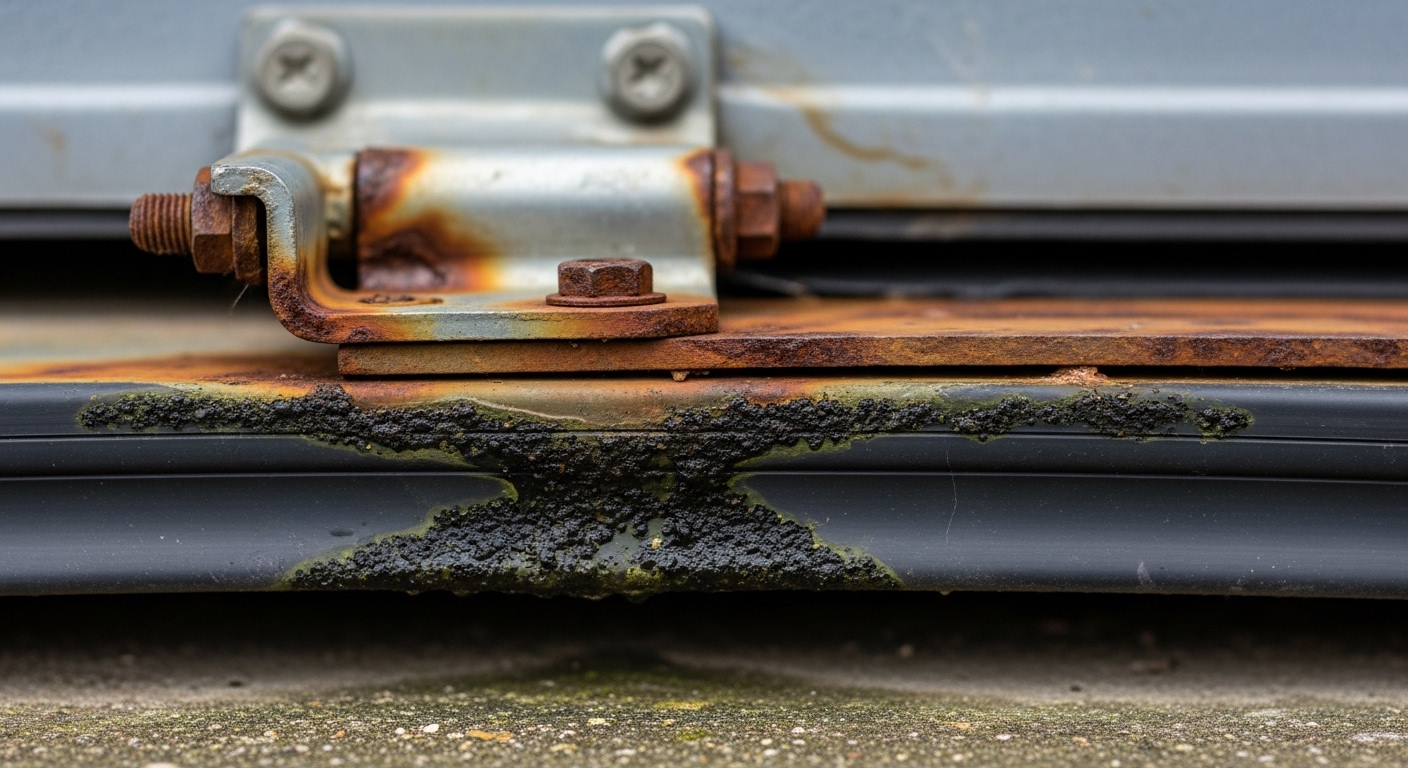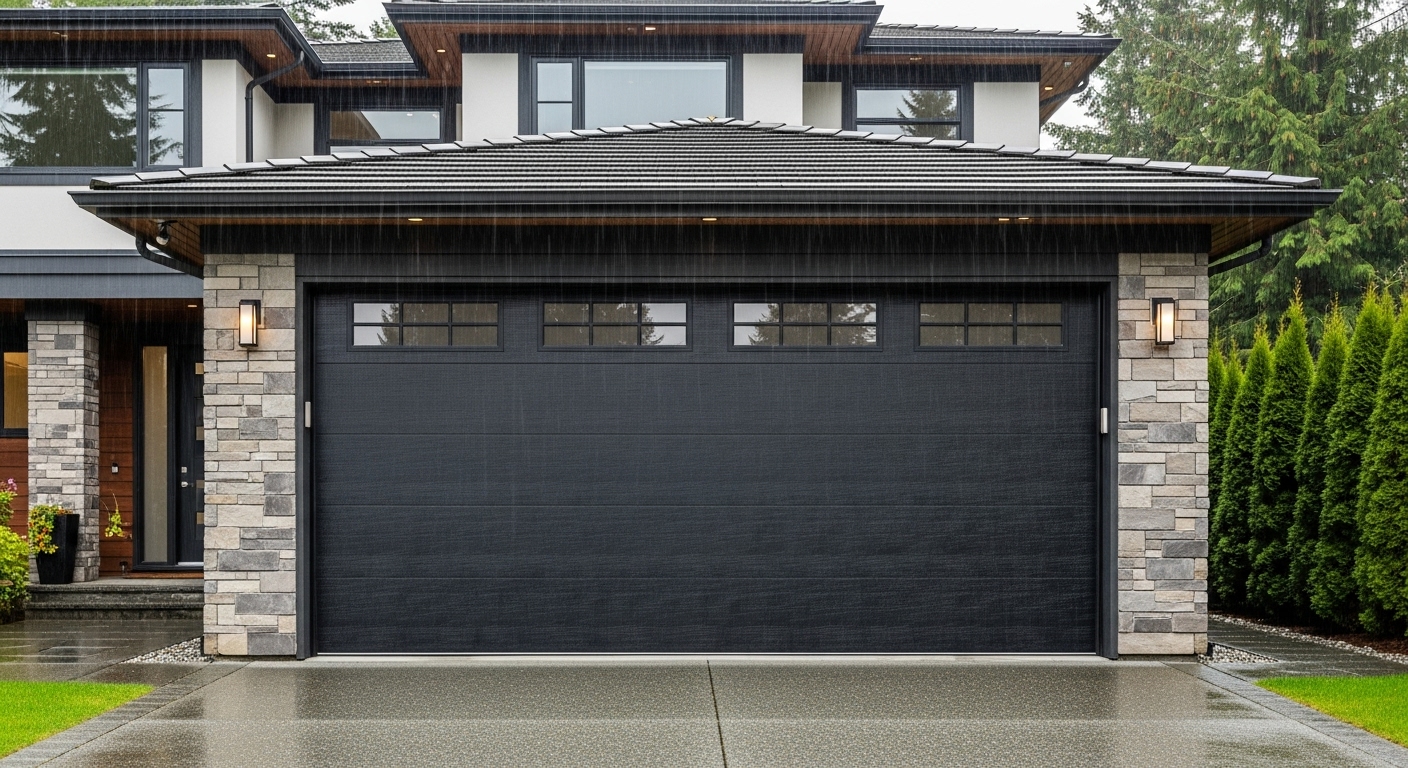How to Choose the Right Garage Door Material for Vancouver’s Climate: Wood vs Steel vs Aluminum Comparison Guide
Thinking about upgrading your garage door but worried about Vancouver’s notoriously wet weather wreaking havoc on your investment? You’re totally right to be concerned – choosing the wrong material could mean dealing with rust, warping, or constant repairs that’ll drain your wallet faster than a leaky roof.[IMAGE PLACEHOLDER FOR IMAGE1]Picture this: you’re sipping your morning coffee, watching the rain pour down (again), and suddenly you hear that dreaded grinding sound from your garage door. Sound familiar? As someone who’s helped countless Vancouver homeowners navigate this exact dilemma, I can tell you that your garage door material choice is basically the difference between smooth sailing and a maintenance nightmare. Vancouver’s unique coastal climate – with its persistent moisture, salt air, and those sneaky temperature swings – creates the perfect storm for garage door problems if you don’t choose wisely.The thing is, most people think any garage door will do, but Vancouver’s climate is like that friend who looks sweet but secretly tests every relationship. Your garage door faces rain for about a third of the year, coastal salt air that’s basically kryptonite for metal, and humidity levels that make mold feel right at home. Plus, with garage doors making up nearly 30% of your home’s street-facing appearance, this isn’t just about function – it’s about keeping your curb appeal intact while your door actually, you know, works.Here’s what I’ve learned after years of helping homeowners make this choice: the “best” material isn’t always the most expensive one, and it’s definitely not one-size-fits-all. Some materials thrive in our coastal conditions while others practically beg for constant babying. The key is understanding how each material handles Vancouver’s specific challenges, from West End salt spray to Richmond’s occasional frost.
Key Outtakes:
- Steel garage doors offer exceptional durability but require proper coatings to resist Vancouver’s moisture and salt air
- Aluminum provides superior corrosion resistance making it ideal for coastal areas, though it’s more susceptible to dents
- Wood garage doors need extensive maintenance in Vancouver’s wet climate to prevent warping, rot, and mold issues
- Fiberglass combines moisture resistance with wood-like aesthetics, making it suitable for humid coastal conditions
- Insulated doors with high R-values (12+) are essential for Vancouver’s temperature fluctuations and energy efficiency

Understanding Vancouver’s Climate Impact on Garage Doors
Let me paint you a picture of what your garage door is actually up against in our beautiful but challenging city. Vancouver’s climate isn’t just “a bit rainy” – it’s a complex cocktail of moisture, salt, and temperature changes that would make even the toughest materials sweat (if they could). Understanding these challenges is like getting the cheat codes for making the right material choice.The moisture factor alone is enough to make any homeowner nervous. In Vancouver, rain is common throughout the year, and all of that moisture can wreak havoc on metal components and warp wooden doors. Rust will silently eat away at the springs, hinges, and tracks of your garage door, turning what should be a smooth operation into a creaky, grinding mess. I’ve seen garage doors that looked fine on the outside but had completely corroded hardware hidden behind the panels – not exactly the surprise you want on a busy Monday morning.But wait, there’s more! Not only are Vancouver homes exposed to rain, but also to salty air, especially near the sea. Salt is an accelerator for corrosion and rust on garage doors, which means if you’re anywhere near the water (and let’s face it, in Vancouver, you’re never that far), your garage door is basically getting a corrosive bath every day. It’s like living next to the ocean comes with this hidden tax on your home’s metal components. The temperature game is trickier than most people realize. Vancouver experiences distinct seasons, with short, warm, and dry summers contrasting sharply with very cold, wet, and overcast winters. The temperature fluctuations, ranging from an average low of 36°F to a high of 83°F, combined with significant precipitation, demand careful consideration of garage door materials. These swings cause expansion and contraction cycles that can stress joints, seals, and panels over time.Here’s something most people don’t think about: moist air creates the perfect environment for mildew and mould to grow, especially on weather seals located at the bottom of the garage door. I’ve walked into garages that looked like science experiments gone wrong, with black mold creeping up the door seals and into the garage space. Not exactly the vibe you’re going for when you’re trying to protect your car and storage items.The humidity factor extends beyond just visible moisture too. Vancouver’s unique climate – characterized by persistent moisture, wind, and occasional sand – continues to present significant challenges for homeowners. This isn’t just about the days when it’s actively raining; it’s about the constant ambient moisture that never quite goes away, even during our “dry” spells.
The temperature game is trickier than most people realize. Vancouver experiences distinct seasons, with short, warm, and dry summers contrasting sharply with very cold, wet, and overcast winters. The temperature fluctuations, ranging from an average low of 36°F to a high of 83°F, combined with significant precipitation, demand careful consideration of garage door materials. These swings cause expansion and contraction cycles that can stress joints, seals, and panels over time.Here’s something most people don’t think about: moist air creates the perfect environment for mildew and mould to grow, especially on weather seals located at the bottom of the garage door. I’ve walked into garages that looked like science experiments gone wrong, with black mold creeping up the door seals and into the garage space. Not exactly the vibe you’re going for when you’re trying to protect your car and storage items.The humidity factor extends beyond just visible moisture too. Vancouver’s unique climate – characterized by persistent moisture, wind, and occasional sand – continues to present significant challenges for homeowners. This isn’t just about the days when it’s actively raining; it’s about the constant ambient moisture that never quite goes away, even during our “dry” spells.
Steel Garage Doors: The Tough Cookie with an Achilles’ Heel
Now that we understand what we’re dealing with climate-wise, let’s dive into steel doors – the popular kid in school who’s tough but has some secrets to hide. Steel garage doors are like that reliable friend who’s always there for you, but you need to know how to take care of them properly.Steel garage doors are incredibly popular, and for good reason. They’re engineered to withstand harsh weather conditions, including heavy rain and fluctuating temperatures, making them resistant to both rust and warping when properly treated. Think of steel as the superhero of garage door materials – strong, dependable, and ready to face whatever Vancouver throws at it. The durability factor alone makes many homeowners lean toward steel, especially when they’re tired of dealing with maintenance headaches. The security aspect is huge too. If you’ve ever worried about break-ins or just want that peace of mind that comes with knowing your garage is properly protected, steel delivers. These doors are tough to dent significantly and provide excellent resistance against forced entry. Plus, they come in a mind-boggling variety of styles and finishes, including wood-grain textures that give you the aesthetic appeal without the maintenance nightmare.Here’s where it gets interesting: the cost factor. Steel garage doors typically have a lower upfront cost and provide strong long-term value thanks to their durability and insulation options. We’re talking budget-friendly without sacrificing performance – basically the sweet spot that most Vancouver homeowners are looking for. You can expect to budget around $2,000 to $5,000 for a single steel garage door when professionally installed, which puts it in the accessible range for most families.But – and this is a big but – not all steel doors are created equal, especially when it comes to Vancouver’s coastal conditions. The key is in the coating and treatment. Many modern steel doors, including premium options, are manufactured with an anti-corrosion protective coating, making them suitable for coastal areas. This isn’t just marketing fluff; it’s the difference between a door that lasts decades and one that starts showing rust spots after a few rainy seasons.The insulation game is where steel really shines. Steel doors can be paired with excellent insulation materials like polyurethane, which not only helps with energy efficiency but also reduces noise – crucial if your garage is attached to your home and you don’t want to wake up the whole family when you leave for work early. The combination of steel’s structural integrity and modern insulation technology creates a door that performs well in Vancouver’s temperature swings.However, let’s keep it real about the challenges. Steel’s main weakness in our climate is its potential for rust and corrosion, especially if the protective coating gets damaged or if you choose a lower-quality option without proper marine-grade protection. Once rust starts, it’s like a slow-motion disaster that spreads and weakens the entire door structure. Regular maintenance and immediate attention to any coating damage are non-negotiable.The thermal conductivity of steel can also work against you if you don’t choose an insulated option. Uninsulated steel doors can become incredibly cold in winter and hot in summer, potentially affecting your garage’s internal climate and energy efficiency. In Vancouver’s climate, an uninsulated steel door is basically a giant thermal bridge.
The security aspect is huge too. If you’ve ever worried about break-ins or just want that peace of mind that comes with knowing your garage is properly protected, steel delivers. These doors are tough to dent significantly and provide excellent resistance against forced entry. Plus, they come in a mind-boggling variety of styles and finishes, including wood-grain textures that give you the aesthetic appeal without the maintenance nightmare.Here’s where it gets interesting: the cost factor. Steel garage doors typically have a lower upfront cost and provide strong long-term value thanks to their durability and insulation options. We’re talking budget-friendly without sacrificing performance – basically the sweet spot that most Vancouver homeowners are looking for. You can expect to budget around $2,000 to $5,000 for a single steel garage door when professionally installed, which puts it in the accessible range for most families.But – and this is a big but – not all steel doors are created equal, especially when it comes to Vancouver’s coastal conditions. The key is in the coating and treatment. Many modern steel doors, including premium options, are manufactured with an anti-corrosion protective coating, making them suitable for coastal areas. This isn’t just marketing fluff; it’s the difference between a door that lasts decades and one that starts showing rust spots after a few rainy seasons.The insulation game is where steel really shines. Steel doors can be paired with excellent insulation materials like polyurethane, which not only helps with energy efficiency but also reduces noise – crucial if your garage is attached to your home and you don’t want to wake up the whole family when you leave for work early. The combination of steel’s structural integrity and modern insulation technology creates a door that performs well in Vancouver’s temperature swings.However, let’s keep it real about the challenges. Steel’s main weakness in our climate is its potential for rust and corrosion, especially if the protective coating gets damaged or if you choose a lower-quality option without proper marine-grade protection. Once rust starts, it’s like a slow-motion disaster that spreads and weakens the entire door structure. Regular maintenance and immediate attention to any coating damage are non-negotiable.The thermal conductivity of steel can also work against you if you don’t choose an insulated option. Uninsulated steel doors can become incredibly cold in winter and hot in summer, potentially affecting your garage’s internal climate and energy efficiency. In Vancouver’s climate, an uninsulated steel door is basically a giant thermal bridge.
Aluminum Garage Doors: The Coastal Champion
If steel is the reliable workhorse, then aluminum is the smart, adaptable cousin who’s specifically built for coastal living. After watching countless homeowners struggle with rust issues on other materials, I’ve become a big fan of aluminum for Vancouver’s unique challenges – though it’s not without its own personality quirks.

Aluminum offers a lightweight alternative to steel while still providing excellent weather resistance, and here’s the kicker: aluminum is naturally rust-resistant, making it a great option for Vancouver’s wet climate. This isn’t just a minor advantage; it’s a game-changer for anyone living near the water or in high-moisture areas. While other


